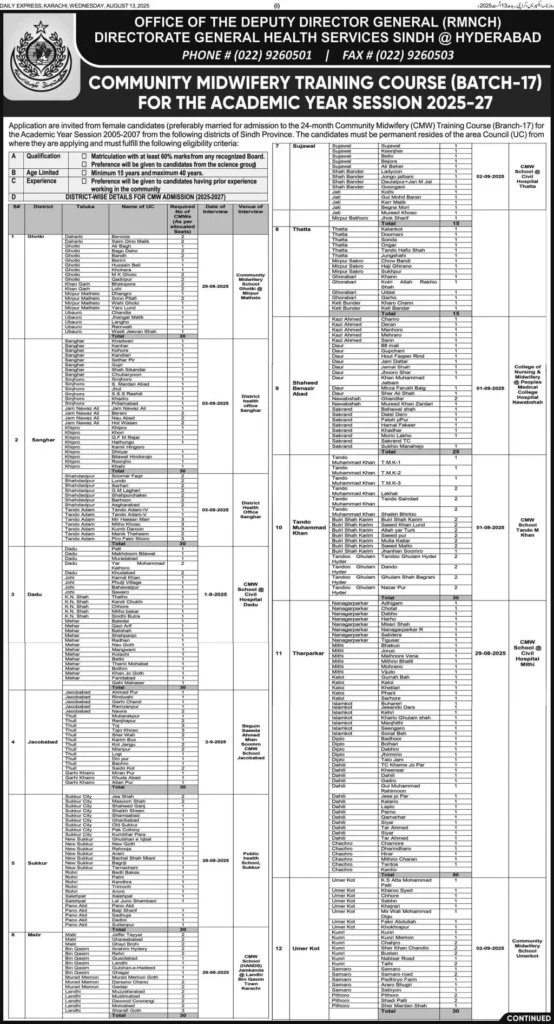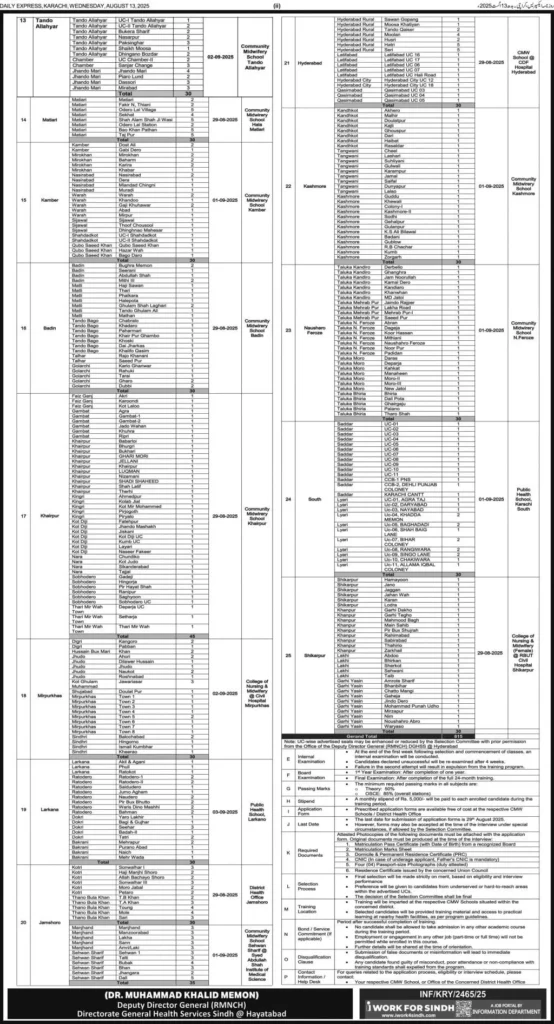Sindh Launches CMW Training Program 2025: A Landmark Initiative to Empower Local Women and Revolutionize Rural Healthcare
Sindh Launches CMW Training Program 2025, In a landmark move to strengthen grassroots healthcare and improve maternal and child health outcomes across the province, the Directorate General Health Services Sindh has announced the launch of its highly anticipated Community Midwifery Training Course (CMW) for Batch-17. This comprehensive 24-month academic program for the 2025-27 session is a call to action for young, dedicated female candidates from specified districts to become the next generation of frontline healthcare providers in their own communities.
This initiative is far more than a simple training program; it is a strategic investment in the future health of Sindh. By training and empowering local women as professional midwives, the government aims to tackle the critical challenges of maternal and infant mortality, particularly in rural and underserved areas. The program provides a clear path to a respected and vital profession, complete with a monthly stipend to support candidates during their training. The final date for the submission of applications is August 29, 2025.
The vision behind the Community Midwifery Program is both profound and practical. It recognizes that the most effective healthcare is often local, trusted, and culturally sensitive. By training a midwife from within a specific Union Council, the program ensures that when she graduates, she is not an outsider but a familiar, trusted figure. This breaks down significant barriers to access and encourages expectant mothers to seek professional care. These community midwives will become the first point of contact for maternal, newborn, and child health services, providing essential prenatal care, assisting with safe deliveries, offering postnatal support, and promoting health education.
To be considered for this life-changing opportunity, applicants must meet a specific set of eligibility criteria designed to identify dedicated and capable candidates. The program is open exclusively to female candidates who hold a Domicile of Sindh and were born between the years 2005 and 2007, ensuring a young and energetic cohort. Academically, a candidate must have passed her Matriculation (Secondary School Certificate) with at least 50% marks from any recognized Board. While this is the minimum requirement, preference will be given to candidates who have prior experience in a relevant healthcare field, signaling a commitment to the profession.
Recognizing that many potential candidates may come from economically disadvantaged backgrounds, the government has structured the program to be highly supportive. Each enrolled student will receive a monthly stipend of Rs. 5,000/- for the entire 24-month duration of the course. This financial assistance is a crucial enabler, allowing young women to dedicate themselves to their studies without the burden of financial stress, thereby making the program accessible to all segments of society. The training itself is rigorous, culminating in a final examination that, upon successful completion, will certify them as qualified Community Midwives.
The scope of this initiative is truly province-wide, reaching into the heart of nearly every district in Sindh. The program has allocated a specific number of seats for designated Union Councils to ensure equitable representation and to address healthcare needs at the most local level. The rollout spans major urban centers and vast rural landscapes, from the bustling districts of Karachi and Hyderabad to the agricultural heartlands of Sanghar, Badin, and Khairpur. Crucially, it extends to more remote and historically underserved areas such as Tharparkar, Umerkot, Jacobabad, and Kashmore. This meticulous, UC-level planning ensures that the benefits of the program are distributed where they are needed most, creating a robust network of skilled midwives across the entire province. The official advertisement contains the precise breakdown of seat allocations for each Union Council, which candidates are urged to consult.
“Community-based midwifery programs are the single most effective intervention for reducing maternal mortality in rural areas,” says a public health specialist with extensive experience in the development sector. “By training women from within the community, you overcome cultural, linguistic, and accessibility barriers that often prevent women from seeking care. This initiative by the Sindh Health Department is not just about training; it's about building a sustainable, trusted healthcare infrastructure from the ground up. It is a crucial investment in the future health of the province and a powerful tool for female empowerment.”
The selection process is designed to be rigorous and merit-based, ensuring that only the most suitable candidates are chosen. It involves a multi-stage evaluation that begins with a written test. Following the test, shortlisted candidates will be called for a formal interview to assess their motivation, communication skills, and aptitude for the demanding role of a midwife. A final medical examination will be conducted to ensure candidates are physically fit for the challenges of the profession. The dates and venues for these tests and interviews are specific to each district and have been clearly laid out in the official announcement. For instance, tests in Kamber are scheduled for September 1st, while those in Umerkot will take place on September 2nd, with similar schedules for all other districts throughout the month of September 2025.
How to Apply
The application process requires careful attention to detail and must be completed by the firm deadline of August 29, 2025. Interested candidates must first obtain the prescribed application form and fill it out completely. The application must be submitted along with a comprehensive set of attested documents. This package should include photocopies of the candidate's Matriculation Pass Certificate and Marks Sheet, the Domicile Certificate, the Permanent Residence Certificate (PRC), the Computerized National Identity Card (CNIC) or B-Form, a Character Certificate, and four recent passport-sized photographs. All documents must be properly attested. The completed application package must then be submitted directly to the designated training venue for the applicant's respective district, as specified in the official advertisement. It is crucial to note that candidates will be required to produce all their original documents for verification at the time of the interview. Incomplete applications or those submitted after the deadline will not be considered.



